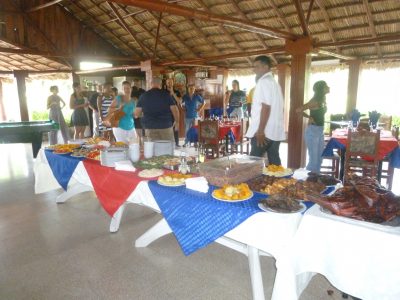Students and faculty study sustainable agriculture in Cuba
When students and faculty recall the time they spent in Cuba during the spring of 2019, they may remember the spicy taste of a delicious lunch or lively times learning to dance the salsa in the evenings at the residencia where they stayed. They will also point out the remarkable lessons they learned about urban agriculture, pest management and organic and sustainable farming in a country that was forced to change nearly all its practices in a relatively short period of time.
The course for which they traveled to Cuba, entitled Food and Revolution: The Cuban Experience, is the result in part of efforts by a faculty team from the College supported by grant from the Innovation Fund of 100,000 Strong in the Americas. A partnership between the US Department of State, Partners of the Americas and NAFSA: Association of International Educators, the Innovation Fund student exchange and training programs between the Americas. In 2017, CAHNR faculty members and administrators from UConn’s Office of Global Affairs visited the country to make connections for collaborations, including research and student exchanges.
Global Affairs at UConn supports student exchange and scholarly activities and is committed to fostering growing connections between Cuban students and scholars and the global faculty and student body at UConn, as well as encouraging UConn students and faculty to engage in research and programs in Cuba. One of UConn Global Affairs’ eight strategic objectives is to “Increase and diversify study abroad participation and opportunities,” and the Marlene M. Johnson Innovation Challenge for U.S.-Cuba, Caribbean, and Central American Academic Mobility program is an exciting opportunity to expand upon this objective. The program will foster goodwill and lead to new relationships, professional networks, and communities of practice between people of Cuba and people of the U.S.
For Ana Legrand, Steven Zinn and the seven students who traveled with them, the program was a success. Legrand, assistant extension professor in the Department of Plant Science and Landscape Architecture, and Zinn, professor and head of the Department of Animal Science, collected the students’ impressions of their experiences.
“We had them write their reflections at the end of the program. They were very positive about the experiences and eye-opening in many ways,” Legrand says.
The group visited a range of Cuban institutions to look at programs related to plant science, animal science, ecology, agroecology, pest management and plant and animal health. At the various research sites, the group members heard lectures, watched demonstrations and met faculty and students. No one in the group spoke Spanish except Legrand, so translators from Instituto de Ciencia Animal (ICA) traveled with them and provided support.

During the US trade embargo, Cuba relied heavily on the Soviet Union to support its agricultural economy. With the collapse of the Soviet Union, Cuba entered a severe food crisis. Without inputs for traditional commercial agricultural practices, Cuba had to move quickly to address the crisis. Farmers implemented sustainable agriculture, organic farming and integrated pest management practices that continue to be the foundation of of their food production.
The CAHNR group visited farms and research facilities and learned about Cuba’s long commitment to education. “When growers were forced to change, they were helped a great deal by the educational infrastructure for science and research. They turned to these institutions to come up with alternatives,” says Legrand.
An educational experience must be multifaceted. In the mornings, the group toured facilities and met with scientists. In the evenings, it was time for dance lessons and listening to remarkable performances of Afro-Jazz. Tours of the Museum of Art and Art History and a discussion of how art changed after the revolution enhanced the cultural experience.
Legrand was moved by the hospitality of the Cuban people at the various locations where the group visited and at the residencia. The meals were banquets, she remarks, noting that to assemble ingredients, their hosts had to visit many vendors and markets to purchase the food.
“I was humbled by how much they did with so little,” she says.
One student summed up the experience by reflecting, “Food and Revolution was a wonderful capstone to my undergraduate plant science career. The lessons allowed me to think about what I have learned about plants, fungi, bacteria, insects and soils and how they interact with both plant and animal production in the Cuban agricultural environment. I genuinely appreciate the kindness of the people … I’m very grateful to have been able to study abroad in Cuba. I will carry the lessons and remembrances with me into the future, disseminate and apply them in the fields that connect us all.”
College faculty hope to repeat the program and to bring Cuban students to Storrs in the future.
Participants earned three UConn credits. A fee of $3,195 covered the credits, meals, housing, transportation and most events. A few dinners were at the students’ own cost.
For more information on this program, email Ana.Legrand@uconn.edu or Steven.Zinn@uconn.edu. Information on this and other UConn study abroad programs is available at abroad.uconn.edu.